Stade des Volcans, Goma DRC April 5th
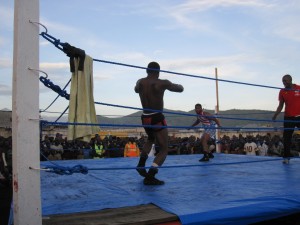 There is a universal appeal to professional wrestling—you will find it in any corner of the world, the combination of faux combat, gymnastic ability and pure acting and theatre finding resonance for audiences in the recognisable villains and heroes.
There is a universal appeal to professional wrestling—you will find it in any corner of the world, the combination of faux combat, gymnastic ability and pure acting and theatre finding resonance for audiences in the recognisable villains and heroes.
The format is generally adapted to local taste and context but the strangest this writer has seen—or at least imagined—are the zombie wrestlers of the Democratic Republic of Congo. There is definitely unique local context: a wrestler in a tight spot in the Congo can call upon powers that Hulk Hogan and The Rock could only imagine—full on magic and witchcraft.
I am considering this while standing in a large crowd pushed up against an outdoor ring at the Stade des Volcans in Goma, eastern Congo watching two wrestlers engaged in combat, with bulging eyes, dripping blood from their mouths like vampires and wearing what may be the strangest outfits for pro-wrestling anywhere, a combination of leopard skin tights and bits of women’s clothing—a short tutu and a garter belt head band for one. Another is wearing a skin tight body suit plastered with the American flag and a second, more traditionally, short briefs.
One wrestler, previously on the losing end of the fight, suddenly introduces a fetish and hypnotizes the other fighter, who is now walking around the ring with jerky motions like a zombie, completely under the spell and direction of the opponent who wears what is a truly demonic smile. Later both have somehow become zombiefied and stagger toward each other in a battle over who has the strongest juju.
The sense of menace seems real and the crowd loves it—there are sighs and shouts as this opéra bouffe is unfolding. Life is short and capricious in Congo—you can be felled by many things from disease and warfare to, as with this performance, witchcraft. I have to admit it is transfixing.
The wrestling is lead-up to the day’s main event—Congo’s Super Welter boxing championship, between the great Kibomango, the brave and ambitious one eyed ex-child soldier, and Manda Yanick, the challenger from Lubumbashi, Congo’s second city. Manda is spooked at hearing Kibomango is being backed by a boxing promoter from Canada but has come to make the challenge here in Goma, our home turf.
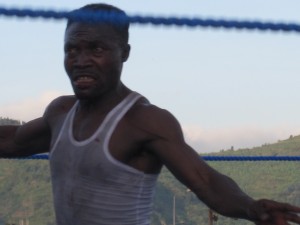 Rumours are interesting things and the ones that circulate here are outlandish. Already it is an accepted fact that I am a high profile fight promoter and my absence from Goma over the previous 2 weeks—while in hospital in Nairobi—was actually a trip to the US to line up a fight tour for Kibomango. Much as I’ve aimed to be low key about working with Kibomango—who has been my boxing instructor—I can’t avoid what people assume me to be: a powerful foreign benefactor. And anyway our lives are already moving closer together—Kibomango has been hired to direct my NGO’s sport programme for street youths.
Rumours are interesting things and the ones that circulate here are outlandish. Already it is an accepted fact that I am a high profile fight promoter and my absence from Goma over the previous 2 weeks—while in hospital in Nairobi—was actually a trip to the US to line up a fight tour for Kibomango. Much as I’ve aimed to be low key about working with Kibomango—who has been my boxing instructor—I can’t avoid what people assume me to be: a powerful foreign benefactor. And anyway our lives are already moving closer together—Kibomango has been hired to direct my NGO’s sport programme for street youths.
Today’s fight has been scheduled and rescheduled many times and it is clear that powerful forces in the boxing world have been obstructing it. Kibomango killed his last challenger, Saidi, right here in this same ring last year and has powerful enemies among the fallen boxer’s friends. Recent attempts have been made to impose a life time ban on him. Kibomango speaks with sorrow about the death of Saidi and with frustration that his effort to move his career forward is being blocked. He has, he says, suffered. This fight has been hastily organised with little warning—three days—following intervention at senior levels in the capital. But local organisers still have a few tricks up their sleeve.
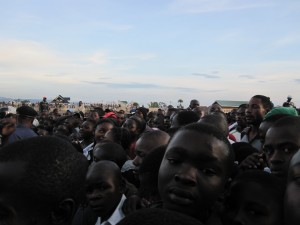 There will be two fights, the one today being for the cheap seats—entrance is 500 Congolese Francs (55¢) and if you can’t pay it is easy enough to climb over the fence, which seems to be the case for the many street children gathered around the ring. The second fight will take place in five days at the Goma Casino—yes, there is a casino here—and will be for the wealthy and powerful folks in town. The provincial governor will attend as will, in this war zone, the senior army commanders.
There will be two fights, the one today being for the cheap seats—entrance is 500 Congolese Francs (55¢) and if you can’t pay it is easy enough to climb over the fence, which seems to be the case for the many street children gathered around the ring. The second fight will take place in five days at the Goma Casino—yes, there is a casino here—and will be for the wealthy and powerful folks in town. The provincial governor will attend as will, in this war zone, the senior army commanders.
Today’s much anticipated fight is taking place outdoors at a football stadium with the ring set up on the field of dark volcanic ash. There is a carnival atmosphere—hawkers are selling food, boiled cassava and little brochette meat skewers. Ice cold mineral water is for sale and as I reach into a cooler for one I notice that the seal on the bottle is broken. I discard it and choose another before noticing they are all opened. It is cold water, not bottled water, that is for sale.
In between fights there is entertainment of sorts—what looks to be jesters doing contortionist tricks in the ring and clowning among themselves. One has an obviously feminine quality, simpering, dancing suggestively and wearing bright yellow lycra bicycle shorts, a tank top and a long multi-coloured Dr Who type scarf. Others are wearing make-up, including face blanche.
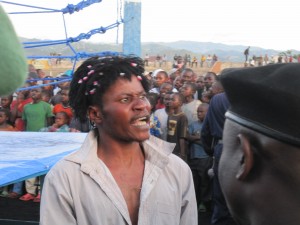 As the afternoon wears on a sense of expectancy begins to build. The crowd is mostly well behaved down at ring side where we are packed 50 or 60 deep. The one real fight of the day takes place in the VIP section of the bleachers, next to the district police commander’s booth, although there is one shoving match in front of me between a soldier and the AK47 wielding police—the latter in charge of security. This leads to a reaction from the other soldiers who are here in uniform, which is more serious—the army and police are rivals and a fist fight between them can lead to a gun fight. But the dispute is eventually settled amicably. In fact most of the crowd dynamics are benign; locals are patient and well used to mediating conflict.
As the afternoon wears on a sense of expectancy begins to build. The crowd is mostly well behaved down at ring side where we are packed 50 or 60 deep. The one real fight of the day takes place in the VIP section of the bleachers, next to the district police commander’s booth, although there is one shoving match in front of me between a soldier and the AK47 wielding police—the latter in charge of security. This leads to a reaction from the other soldiers who are here in uniform, which is more serious—the army and police are rivals and a fist fight between them can lead to a gun fight. But the dispute is eventually settled amicably. In fact most of the crowd dynamics are benign; locals are patient and well used to mediating conflict.
By late afternoon the sun is fading—we are two hours behind schedule and if the boxing does not start soon the match will take place in the dark. Finally there is a ripple of excitement in the crowd, indicating that Kibomango has entered the stadium and is making his way toward the ring surrounded by his own team—all wearing black, Parsons designed, Kibomango Boxing t-shirts. The fight will finally begin.
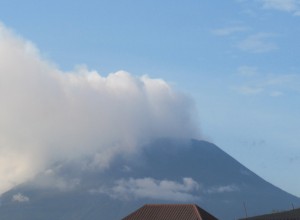 In a strange omen, at about the same time it is noticed that the Nyiragongo Volcano has become active. There is a view of the volcano’s perfect cone and 11,000 foot summit from here in the stadium and it is now spewing ash. The most dangerous in Africa, it has erupted every 3 ½ years on average over the past century and, as the last was in 2002, we are now about due. In recent months it has been noticed that the lava lake is rising and is close to levels previously associated with an eruption.
In a strange omen, at about the same time it is noticed that the Nyiragongo Volcano has become active. There is a view of the volcano’s perfect cone and 11,000 foot summit from here in the stadium and it is now spewing ash. The most dangerous in Africa, it has erupted every 3 ½ years on average over the past century and, as the last was in 2002, we are now about due. In recent months it has been noticed that the lava lake is rising and is close to levels previously associated with an eruption.
Kibomango vaults into the ring with panache and shadow boxes to loud applause from the crowd. The atmosphere is electric. But there is confusion also: the challenger, Manda, is no where to be seen. It is eventually announced that he will not show, apparently having lost his nerve.
What follows is even stranger. It is suddenly announced that the son of the fallen boxer, Saidi, will fight Kibomango. The son, who is not a professional boxer, enters the ring amid much prancing. These events have the clear imprint of advance planning, a set up in fact. This is a dangerous moment for Kibomango and it has been engineered for his disbenefit—he cannot fight a non-professional opponent bent on personal and family revenge. He also cannot disrespect Saidi’s family, the challenge or the occasion either. Although he has done everything possible to atone for the death there are people here who will not let him forget it.
At this point I notice that he is staring straight at me, looking for guidance. This is a moment I have been trying to avoid. I have been helping Kibomango, and we are friends, but I’ve steered clear of any direct influence over his professional life and other decisions, following the “Prime Directive” of non-interference as in Star Trek lore. I am also in Congo as an aid worker and earning the attention, and potential wrath, of powerful local figures in this province is something that could go badly for myself and for the NGO I work for. But I know what I have to do.
Dominique, my co-worker, nudges me: Kibomango is looking at you, to make a decision, you must help him.
I keep my arms crossed firmly over my chest and stare back at Kibomango and slowly shake my head from side to side. He must exit from the ring and exit from this situation as quickly, and with as much dignity, as possible.
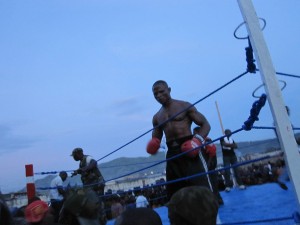 Minutes later Kibomango is out of the ring and preparing to leave the stadium, surrounded by his security team who are parting the crowd, which has surged toward him, both excited and frustrated at the lack of resolution to the day’s main event. I am staying back from all this, still trying to maintain the fiction that I am a disinterested bystander. I soon realise that is a fiction I can no longer maintain. As the only white guy in a crowd of 5,000 people in Africa you are not invisible—and, anyway, everyone here also knows me to be Kibomango’s backer. I am in situ and at the epicentre of one of the most dramatic sporting events in Congo. It is time to take charge of the situation and embrace what is obvious.
Minutes later Kibomango is out of the ring and preparing to leave the stadium, surrounded by his security team who are parting the crowd, which has surged toward him, both excited and frustrated at the lack of resolution to the day’s main event. I am staying back from all this, still trying to maintain the fiction that I am a disinterested bystander. I soon realise that is a fiction I can no longer maintain. As the only white guy in a crowd of 5,000 people in Africa you are not invisible—and, anyway, everyone here also knows me to be Kibomango’s backer. I am in situ and at the epicentre of one of the most dramatic sporting events in Congo. It is time to take charge of the situation and embrace what is obvious.
There is a tug on my shoulder and I turn around to face the team coach—Kibomango wants me to join him. I push through the crowd and am inside the security perimeter, next to Kibomango. I am part of the team. We knock fists and get into lock step, walking abreast together out of the stadium, someone in front of us, carrying a basin of water and sprinkling it on our path, an honour reserved for royalty.
Otherwise all is not lost—the next fight will be on Sunday and it will be for real this time.

This is utterly, inconceivably, beautifully, poetically ridiculous.
I love it.
I can not imagine better drama! I wait with anticipation for Sunday’s result.
wow.
waiting for my pulse to drop….nope.
That was an incredible blog. Loved it.
Looking forward to reading about the fight!
Now Douglas, when we say take ‘care of yourself’ this is not what we mean!